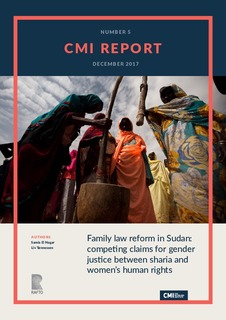Family law reform in Sudan: competing claims for gender justice between sharia and women’s human rights
Research report
Permanent lenke
http://hdl.handle.net/11250/2475478Utgivelsesdato
2017-12-01Metadata
Vis full innførselSamlinger
- Publications [1488]
Originalversjon
Bergen: Chr. Michelsen Institute (CMI Report R 2017:5) 28 p.Sammendrag
This paper focuses on family law reform in Sudan-a country that has been in a state of perpetual conflict that stretches back long before its independence in 1956. The signing of the Comprehensive Peace Agreement (CPA) in 2005 between the ruling Islamist National Congress Party and the Sudan People's Liberation Movement ended Africa's longest running civil war. In the wake of the CPA, activists both inside and outside of the government have particularly been preoccupied with debating Muslim family law reform. Although the peace agreement was largely gender-blind, the interim national constitution of 2005 included clauses on gender equality and affirmative action (Itto 2006). Article 32 on the rights of women and children provides, "The State shall guarantee equal right of men and women to the enjoyment of all civil, political, social, cultural and economic rights, including the right to equal pay for equal work and other related benefits." This sparked processes of harmonizing Sudanese laws to the constitution. Activists inside and outside of the government have demanded law reform on a range of women's rights issues, such as the criminalization of female genital mutilation, the introduction of a women's quota to Sudan's legislative assemblies, reform of the criminal law's definition of rape, and equality-promoting changes to Sudan's family law. The Personal Status Law for Muslims (also called the family law in this paper) was codified in 1991. It has emerged as a highly contested piece of legislation in post-CPA Sudan, to the point that it was a central topic in the 2010 election campaign and a disputed theme in constitutional reform debates in 2017. The 1991 law has been described as a backlash against women's rights activists, as it (among other things) legalizes child marriage, stipulates a wife's obedience to her husband, and denies wives the possibility of working outside of the home without their husbands' permission. It builds on the principle of qawama
